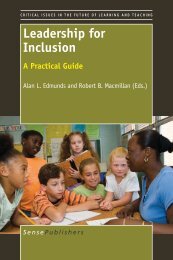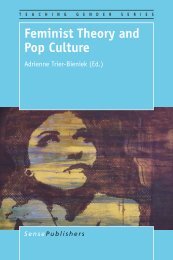CHANGING OUR MINDSBendixen, L. D., & Rule, D. C. (2004). An integrative approach to personal epistemology: A guidingmodel. Educational Psychologist, 39(1), 69–80.Berger, J. G. (2004). Dancing on the <strong>threshold</strong> of meaning: Recognizing <strong>and</strong> underst<strong>and</strong>ing the growingedge. Journal of Transformative Education, 2(4), 336–351.Boyd, R. D., & Myers, J. G. (1988). Transformative education. International Journal of LifelongEducation, 7(4), 261–284.Bruner, J. (1997). Celebrating divergence: Piaget <strong>and</strong> Vygotsky. Human Development, 40, 63–73.Carroll, B. B. (2007). Overcoming the immunity to change: Robert Kegan [Electronic Version]. InHarvard graduate school of education web site: Impact on the world: Stories of impact. RetrievedJune 22, 2007, from http://www.gse.harvard.edu/impact/stories/faculty/kegan.phpCh<strong>and</strong>ler, M. (1995). Is this the end of ‘the age of development,’ or what? Or: Please wait a minute,Mr. Post-Man. The Genetic Epistemologist, 23(1). Retrieved April 2, 2008, from http://www.piaget.org/GE/Winter95/Ch<strong>and</strong>lerW95.htmlCross, P. (1999). What do we know about students’ <strong>learning</strong> <strong>and</strong> how do we know it? Innovative HigherEducation, 23(4), 255–270.Davies, P. (2006). Threshold <strong>concepts</strong>: How can we recognize them? In J. H. F. Meyer & R. L<strong>and</strong> (Eds.),Overcoming barriers to student underst<strong>and</strong>ing. Oxon, UK: Routledge.Debold, E. (2002, Fall/Winter). Epistemology, fourth order consciousness, <strong>and</strong> the subject-objectrelationship or... How the self evolves with Robert Kegan. What is Enlightenment?: RedefiningSpirituality for an Evolving World, 22. Retrieved June 18, 2007, from http:www.wie.org/i2022/kegan.aspDennett, D. (1991). Chapter 7: The evolution of consciousness. In Consciousness explained (pp. 171–226).New York: Little, Brown <strong>and</strong> Company.Dole, J. A., & Sinatra, G. M. (1998). Reconceptualizing change in the cognitive construction ofknowledge. Educational Psychologist, 33(2/3), 109–128.Entwistle, N., & Walker, P. (2002). Strategic alertness <strong>and</strong> exp<strong>and</strong>ed awareness within sophisticatedconceptions of teaching. In N. Hativa & P. Goodyear (Eds.), Teacher thinking, beliefs <strong>and</strong>knowledge in higher education (pp. 15–39). Dordrecht, The Netherl<strong>and</strong>s: Kluwer Academic Publishers.Erikson, E. (1959). Identity <strong>and</strong> the life cycle: Selected papers. New York: International Universities Press.Ferrari, M., Pinard, A., & Runions, K. (2001). Piaget’s framework for a scientific study of consciousness.Human Development, 44(4), 195–213.Festinger, L. (1957). A theory of cognitive dissonance. Evanston, IL: Row.Fiddler, M., & Marienau, C. (1995). Linking <strong>learning</strong>, teaching, <strong>and</strong> development. In K. Taylor &C. Marienau (Eds.), Learning environments for women’s adult development: Bridges toward change(Vol. New Directions for Adult <strong>and</strong> Continuing Education, 65, pp. 73–82). San Francisco: Jossey-Bass.Gaarder, J. (1994). Sophie’s world: A novel about the history of philosophy (P. Moller, Trans.). NewYork, USA: Farrar, Straus, <strong>and</strong> Giroux.Goldhaber, D. E. (2000). Theories of human development: Integrative perspectives. Mountain View,CA: Mayfield Publishing Company.Gottlieb, E. (2007). Learning how to believe: Epistemic development in cultural context. Journal of theLearning Sciences, 16(1), 5–35.Hofer, B. K., & Pintrich, P. R. (1997). The development of epistemological theories: Beliefs aboutknowledge <strong>and</strong> knowing <strong>and</strong> their relation to <strong>learning</strong>. Review of Educational Research, 67(1), 88–140.Homeostasis. (2007). [Electronic Version]. In Encyclopædia Britannica. Retrieved September 26,2007, from Britannica Online Encyclopædia http://www.britannica.com/EBchecked/topic/270188/homeostasisJung, C. G. (1959). The basic writings of C. G. Jung (Violet Staub de Laszlo, Ed.). New York: ModernLibrary.Kegan, R. (1982). The evolving self: Problem <strong>and</strong> process in human development. Cambridge, MA:Harvard University Press.Kegan, R. (1994). In over our heads: The mental dem<strong>and</strong>s of modern life. Cambridge, MA: HarvardUniversity Press.17
TIMMERMANSKegan, R., & Lahey, L. L. (2001). How the way we talk can change the way we work: Seven languagesfor transformation. San Francisco: Jossey-Bass.Kohlberg, L., & Mayer, R. (1972). Development as the aim of education. Harvard Educational Review,42(4), 449–496.Lewis, M. D. (2000). The promise of dynamic systems approaches for an integrated account of hum<strong>and</strong>evelopment. Child Development, 71(1), 36–43.Love, P. G., & Guthrie, V. L. (1999). Kegan’s orders of consciousness. New Directions for StudentServices, 88, 65–76.Magen, R. H., Austrian, S. G., & Hughes, C. S. (2002). Chapter 5: Adulthood. In S. G. Austrian (Ed.),Developmental theories through the life cycle (pp. 181–263). New York: Columbia University Press.Meyer, J. H. F., & L<strong>and</strong>, R. (2003). Threshold <strong>concepts</strong> <strong>and</strong> troublesome knowledge: Linkages to waysof thinking <strong>and</strong> practising within the disciplines. In C. Rust (Ed.), Improving student <strong>learning</strong>:Improving student <strong>learning</strong> theory <strong>and</strong> practice – 10 years on. Oxford, UK: Oxford Centre for Staff<strong>and</strong> Learning Development.Meyer, J. H. F., & L<strong>and</strong>, R. (2005). Threshold <strong>concepts</strong> <strong>and</strong> troublesome knowledge (2): Epistemologicalconsiderations <strong>and</strong> a conceptual framework for teaching <strong>and</strong> <strong>learning</strong>. Higher Education, 49(3),373–388.Meyer, J. H. F., & L<strong>and</strong>, R. (Eds.). (2006). Overcoming barriers to student underst<strong>and</strong>ing. Oxon, UK:Routledge.Mezirow, J. (2000). Learning to think like an adult: Core <strong>concepts</strong> of transformation theory. In J. Mezirow(Ed.), Learning as transformation: Critical perspectives on a theory in progress. San Francisco:Jossey-Bass.Moore, W. S. (2002). Underst<strong>and</strong>ing <strong>learning</strong> in a postmodern world: Reconsidering the Perry Schemeof intellectual <strong>and</strong> ethical development. In B. Hofer & P. Pintrich (Eds.), Personal epistemology:The psychology of beliefs about knowledge <strong>and</strong> knowing (pp. 17–36). Mahwah, NJ: LawrenceErlbaum.Murphy, P. K. (2003). The philosophy in thee: Tracing philosophical influences in educational psychology.Educational Psychologist, 38(3), 137–145.Palmer, B., & Marra, R. M. (2008). Individual domain-specific epistemologies: Implications foreducational practice. In M. S. Khine (Ed.), Knowing, knowledge <strong>and</strong> beliefs: Epistemological studiesacross diverse cultures. The Netherl<strong>and</strong>s: Springer.Perkins, D. (1997). Epistemic games. International Journal of Educational Research, 27(1), 49–61.Perkins, D. (1999). The many faces of constructivism. Educational Leadership, 57(3), 6–11.Perkins, D. (2006). Constructivism <strong>and</strong> troublesome knowledge. In J. H. F. Meyer & R. L<strong>and</strong> (Eds.),Overcoming barriers to student underst<strong>and</strong>ing. Oxon, UK: Routledge.Perkins, D. (2007). Theories of difficulty. British Journal of Educational Psychology Monograph Series II(4): Student Learning <strong>and</strong> University Teaching, 31–48.Perry, W. G. (1970). Forms of intellectual <strong>and</strong> ethical development in the college years: A scheme.New York: Holt, Rinehart <strong>and</strong> Winston.Perry, W. G. (1981). Cognitive <strong>and</strong> ethical growth: The making of meaning. In A. W. Chickering (Ed.),The modern American college: Responding to the new realities of diverse students <strong>and</strong> a changingsociety (pp. 76–116). San Francisco: Jossey-Bass.Piaget, J. (1950). The psychology of intelligence (M. Piercy & D. E. Berlyne, Trans.). London, UK:Routledge & Paul.Robinson, D., & Groves, J. (2004). Introducing philosophy (Original edition 1998 ed.). Cambridge, UK:Icon Books.Scharmer, C. O. (2000, March 23). Grabbing the tiger by the tail: Conversation with Robert Kegan,Harvard Graduate School of Education. Retrieved July 25, 2007, from http://www.dialogonleadership.org/kegan-1999.htmlSchunk, D. H. (2000). Learning theories: An educational perspective (3rd ed.). Upper Saddle River, NJ:Prentice Hall.18
- Page 1 and 2:
EDUCATIONAL FUTURES: RETHINKING THE
- Page 3 and 4:
EDUCATIONAL FUTURESRETHINKING THEOR
- Page 5 and 6:
A C.I.P. record for this book is av
- Page 7 and 8:
TABLE OF CONTENTS10. Threshold Conc
- Page 9 and 10:
Pax Intrantibus Salus Exeuntibus. L
- Page 11 and 12:
LAND ET ALstudents experience diffi
- Page 13 and 14: LAND ET ALModePreliminalLiminalPost
- Page 15 and 16: LAND ET AL(Barker, 1991, p.184). Th
- Page 17 and 18: LAND ET ALvariations arising from t
- Page 19 and 20: LAND ET ALform of a model of concep
- Page 21 and 22: LAND ET ALQuestions of intersection
- Page 24 and 25: EDITORS’ PREFACEstudents bring to
- Page 26 and 27: EDITORS’ PREFACEconcepts in the f
- Page 28 and 29: EDITORS’ PREFACEIn the final illu
- Page 30 and 31: EDITORS’ PREFACEhence becomes a n
- Page 32 and 33: EDITORS’ PREFACElearning. This th
- Page 34 and 35: EDITORS’ PREFACEa lens or ‘way
- Page 36 and 37: EDITORS’ PREFACEHence learning is
- Page 38 and 39: EDITORS’ PREFACEthe Communitas, w
- Page 40 and 41: EDITORS’ PREFACEBuilding on these
- Page 42 and 43: EDITORS’ PREFACECousin, G. (2009)
- Page 44 and 45: DAVID PERKINSFOREWORDEntrance…and
- Page 46: FOREWORDMeyer, J.H.F., Land, R. & D
- Page 50 and 51: JULIE A. TIMMERMANS1. CHANGING OUR
- Page 52 and 53: CHANGING OUR MINDSKegan’s (1982)
- Page 54 and 55: CHANGING OUR MINDSKegan describes e
- Page 56 and 57: CHANGING OUR MINDSIn fact, Kegan an
- Page 58 and 59: CHANGING OUR MINDSat the epistemolo
- Page 60 and 61: CHANGING OUR MINDSMight a learner r
- Page 62 and 63: CHANGING OUR MINDSreveals an additi
- Page 66: CHANGING OUR MINDSSibbett, C., & Th
- Page 69 and 70: SCHWARTZMANScholarship in liminalit
- Page 71 and 72: SCHWARTZMANTC: the entityThe term T
- Page 73 and 74: SCHWARTZMANA resource for teaching
- Page 75 and 76: SCHWARTZMANunprecedented to attract
- Page 77 and 78: SCHWARTZMANspectrum of scholarship
- Page 79 and 80: SCHWARTZMANrupture and phenomenolog
- Page 81 and 82: SCHWARTZMANfield(s) of one’s cons
- Page 83 and 84: SCHWARTZMAN36DATA: PARTICULARS GIVI
- Page 85 and 86: SCHWARTZMANchallenge than interpret
- Page 87 and 88: SCHWARTZMANStrategies for Teaching:
- Page 89 and 90: SCHWARTZMANThey are redefined here
- Page 91: SCHWARTZMANLoder, J. (1981). The tr




